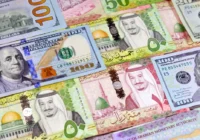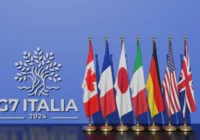In the months since our last installment of Money Matters, alongside continuing wars, we have seen two troubling political developments, troubling in the sense that they have thrown the art of political and economic forecasting into total confusion. The first concerns Europe, which has been left floundering both economically and politically ever since the Russian invasion of Ukraine nearly three years ago. That provoked what turned out to be the ultimately chaotic and ineffectual United States-led NATO response based on the principle of excluding diplomacy at all costs and pursuing a losing cause “as long as it takes.”
This state of crafted ambiguity would inevitably lead to growing instability among the Western governments united in a poorly and clearly failing designed mission, a process confirmed by recent events in France, Germany and, of course, the US. This was further confirmed by the return not only of Donald Trump to the White House, but of a Republican majority in the US Senate, the House and of course, the Supreme Court.
Whether it’s been a good year for democrats — those who believe in the resilience of democracy — is debatable. It has clearly been a good year for Republicans, even in unstable France, where President Emmanuel Macron nominated a Républicain prime minister, despite the fact that les Républicains, formerly the dominant right wing party, were clear losers in this summer’s parliamentary elections, drawing a mere 5.7% of the vote. It was the left-wing coalition, Le Nouveau Front Populaire, that came out on top.
In the meantime, the German coalition government, in power since September 2021, has collapsed and Deutschland will hold a new general election in February 2025. It appears likely that the Christian Democrats (CDU), the party of Angela Merkel, will win that election. That may sound reassuring to some, who believe in bringing back formulas that seemed to work in the past, but Germany’s voters appear increasingly defiant of the ruling elites of the present and past. Rather, they appear attracted by solutions coming from the far-right (Alternative für Deutschland) and the far-left (Bündnis Sahra Wagenknecht). The sense of disillusionment and confusion related to Germany’s policies concerning the Ukraine war have been aggravated by recent events in the US and in Europe itself.
In this context, reports of what took place at the BRICS+ summit in October 2024 in Kazan, Russia made that event and the order it adumbrates resemble a haven of peace and mutual understanding. A major outcome was the resolution to promote “expanding the use of local currencies to Promote Economic Stability” complemented by an expanding list of countries that will be associated with BRICS.
This may explain why the US Congress decided to act with the aim of ensuring that the public does not become seduced by such a harmonious approach to global affairs.
On November 4, Alex Gloy shared this bit of news with us, as he helpfully provided the link to a piece of legislation bearing the ominous title: H.R.1157 – Countering the PRC Malign Influence Fund Authorization Act of 2023.
“Who is paying for the music?” Alex asked. He then provided the figures.
“$1.6 billion ($325 million for 5 years each) appropriated by US Congress to be distributed to journalists to ‘counter the People’s Republic of China Malign Influence’ and the ‘malign influence of the Chinese Communist Party and the Government of the People’s Republic of China and entities acting on their behalf globally.’”
George W. Bush launched his famous “Global War on Terror” primarily with military means in Afghanistan, Iraq and elsewhere. Congress is launching what is beginning to look like a global war on malign influence. In this case the theater of war is journalism. This tells us something about how we should think about what we read in the media over the next five years.
Alex continued with these comments:
“This makes it easy to discard anything you read about China, Russia, and therefore the BRICS in traditional western media as propaganda. When you know what to look for, you see it everywhere. Western media reports on China used to be infatuated with pollution. Now that China is adding more solar capacity than the rest of the world combined – crickets. China’s success in making affordable EVs is greeted with tariffs. Western countries exporting their wares to China are ‘export champions.’ Chinese companies doing the same are ‘dumping overcapacities.’
There is a Chinese high-speed train making the 1,600 km (1,000 miles) trip from Shanghai to Hong Kong in 8 hours. It took my daughter more than that to travel from NYC to Burlington, VT (300 miles).
Every economic report paints a dire picture of the Chinese economy, despite it having grown 5.2% in 2023, and GDP having expanded 17x over the past 25 years.
A rather hilarious example: WaPo’s ‘China ruined caviar for us.’”

Before returning to the question of BRICS, which Congress certainly deems to be a vehicle for China’s “malign influence,” Alex notes that “$325m would have paid for 5,000 public school teachers.” Disinformation is clearly more valuable and especially more urgently required than the information schools seek to instill.
Alex then added the following observations:
“But back to BRICS:
- Yes, the US threw the first stone by cutting Russia off. Russia used to be in the top 20 international holders of Treasury securities ($109 billion in 2017). Russia helped finance the US budget deficit, including the US defense budget!
- From the BRICS perspective the aim to reduce dependency on the US dollar is nothing but logical – it would be stupid to continue to finance the US and run the risk of confiscation.
- As long as the US runs a trade deficit, the external sector (non-US countries), in aggregate, will be forced to accumulate US dollars AND will be forced to keep sending goods and services to the US. As the US dollar is overvalued, this benefits US consumers to the detriment of other countries’ consumers.
- From a US perspective, however, losing the ability to send digital dollars in exchange for real goods and services is, of course, a threat. Losing the status of the world’s reserve currency would go hand in hand with losing the position of global hegemon. Hence the US correctly identifies any attempts to do so as hostile.
- The official reason for the withdrawal by the Bank of International Settlements (BIS) from the mBridge project that aimed at creating a multi-central bank digital currency (CBDC) platform, which had been developed to the MVP stage, was the fact that it would have meant working with a sanctioned country (Russia). But it is probably safe to assume there was heavy US pressure to do so.
- The BRICS countries will have to figure it out by themselves. One solution could be a supra-national currency, pegged to gold (but at a floating rate). National currencies will also have to float against the supra-national currency used for settlements; otherwise, imbalances pile up. Maybe a managed float, like the CNH (or the ECU before introduction of the Euro), to reduce volatility.
- A floating gold peg is, in reality, not a peg, but it helps build confidence.
- If a US person wanted to exchange dollars into gold, they can do so at $2,600 per ounce today. But few people take advantage of that possibility. However, once a currency rapidly loses value, people will line up to buy gold. So, you have to make sure the currency is somewhat stable. This means you need a stable banking system, and a credible lender of last resort (central bank). And some fiscal discipline. Which is hard, even for Germany. If it’s hard for Germany, with its currency account surplus, it’s even harder for emerging economies (strong growth usually leads to strong import growth leading to current account deficits).”
Since Alex’s contribution on November 4, the BIS rescinded its announced decision to scuttle mBridge and write off the investment. It has now agreed to leave it in the hands of central banks who wish to continue developing it and ultimately deploy it. Most observers agree that the likely candidates would be China, Hong Kong, Thailand, and the United Arab Emirates.
Alex has also noted an important point: that the election of Donald Trump has buried any ambition of a US CBDC (Central Bank Digital Currency) at least for the next four years. This offers an opportunity for other nations to leap ahead. Privately-issued Tether is filling the gap for now, but other nations might take advantage of this golden opportunity and benefit from first-mover advantage.
Concerning the BIS decision to drop mBridge, Josh Lipsky of the Atlantic Council noted “that while China could continue developing mBridge, Western central banks may turn their attention to alternative platforms such as Project Agorá, a similar initiative backed by central banks in Europe, Japan, Korea, and the US.”
Will this be the face of a new currency cold war? The first Cold War famously pitted God-fearing capitalism against atheistic communism. This one is more likely to become a contest between “benign influence” on one side and “malign influence” on the other. Future observers will have to decide which one is which.
Join the debate
Money Matters…, is dedicated to developing this discussion and involving all interested parties.
We invite all of you who have something to contribute to send us your reflections at dialogue@fairobserver.com. We will integrate your insights into the ongoing debate. We will publish them as articles or as part of the ongoing dialogue.
*[Fair Observer’s “Crucible of Collaboration” is meant to be a space in which multiple voices can be heard, comparing and contrasting their opinions and insights in the interest of deepening and broadening our understanding of complex topics.]
[Lee Thompson-Kolar edited this piece.]
The views expressed in this article are the author’s own and do not necessarily reflect Fair Observer’s editorial policy.
Support Fair Observer
We rely on your support for our independence, diversity and quality.
For more than 10 years, Fair Observer has been free, fair and independent. No billionaire owns us, no advertisers control us. We are a reader-supported nonprofit. Unlike many other publications, we keep our content free for readers regardless of where they live or whether they can afford to pay. We have no paywalls and no ads.
In the post-truth era of fake news, echo chambers and filter bubbles, we publish a plurality of perspectives from around the world. Anyone can publish with us, but everyone goes through a rigorous editorial process. So, you get fact-checked, well-reasoned content instead of noise.
We publish 2,500+ voices from 90+ countries. We also conduct education and training programs
on subjects ranging from digital media and journalism to writing and critical thinking. This
doesn’t come cheap. Servers, editors, trainers and web developers cost
money.
Please consider supporting us on a regular basis as a recurring donor or a
sustaining member.
Will you support FO’s journalism?
We rely on your support for our independence, diversity and quality.










Comment